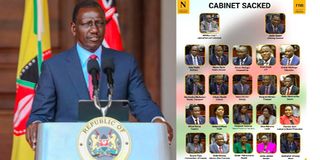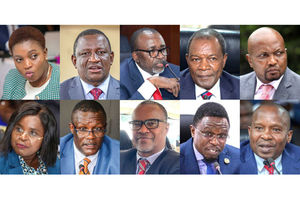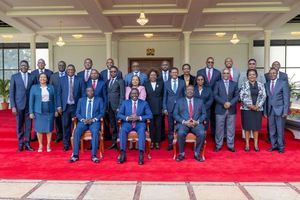
President William Ruto (left) sacked his entire Cabinet on July 11, 2024.
It was Thursday at State House, Nairobi. President Ruto’s voice was breaking. The confidence was gone, and the weight of what he was about to do hung heavily in the air, a testament to the gravity of the decision that lay before him.
The aide-de-camp stood a distance away, a silent observer to the unfolding drama. President Ruto cast the image of a lonely man, burdened by the enormity of the moment, as the nation held its breath. He spoke. And, when he was done – he swiftly walked away into the bowels of State House.
Of late, President Ruto’s receding hairline and patches of thinning hair are unmistakable, making it clear to the public that the pressures of the presidency are taking a toll. Falling just as fast, according to recent opinion polls, is his popularity and that of his government. Those who have keenly watched the president have noted that he has abandoned the Kaunda suits for Savile Row attire to restore an image of professionalism, authority, and competence. He also sounds like a man under siege, his legacy approaching a precipice.
But, will the President clean his house with a dirty broom? Last month, an Infotrak opinion poll rated the President and his deputy, Rigathi Gachagua, as D for their performance. The entire Cabinet, as well as the Judiciary and Parliament, also scored D, an indicator of people’s perception of the Ruto regime.
Pundits have been voicing concern over the competency of the Cabinet ever since it was named in September 2022. Suba MP John Mbadi’s observations during the vetting of the Cabinet now seem prophetic: “These are not people who can run the government. We have a choice to make either decision: to reject over 60 per cent of these names or give President Ruto his skunk. Let us not interfere with it. We give it to him.”
Mbadi, like most of Ruto’s critics, had told Parliament that most of the nominees had “integrity issues, were incompetent, unqualified and cannot deliver the country from where it is to the next level”. From murder to corruption charges, some of the nominees came to office with tainted pasts – and so was the President, who was also under pressure to hand back controversial public land where he had built the Weston Hotel in Nairobi.
More so, his deputy was equally facing Sh7.3 billion corruption charges that were later withdrawn by then Director of Public Prosecutions Noordin Haji. The Asset Recovery Agency later disowned a court victory over Gachagua in which the DP was to forfeit Sh200 million to the State after failing to account for its source. The Ruto government withdrew most of the high-level corruption cases instituted during the reign of President Uhuru Kenyatta, and some of them returned to their former positions – or became presidential advisers. For instance, after the collapse of the Arror-Kimwarer case, former Finance CS Henry Rotich was appointed Senior Advisor on Fiscal Affairs and Budget Policy at the State House. At the same time, Joe Sang returned to his former position at Kenya Pipeline after the Sh1.9 billion Kisumu oil jetty case was thrown out.
Such appointments fortified a narrative that integrity was not a criterion in President Ruto’s rulebook. For instance, close Ruto allies Mary Wambui and Anthony Mwaura– and who had court cases – were appointed as Chairman of Communications Commission of Kenya and Kenya Revenue Authority. Elsewhere, protests by specific judges that the office of the director of prosecutions was sabotaging corruption cases were ignored. The Ruto regime was scoring an own goal in most of the appointments as friendship, tribalism, and patronage politics played a role.
In this space of impunity, scandals would immediately emerge, ranging from an oil-import scandal to the disappearance of condemned sugar and subsidised fertiliser scandals. More so, the Cabinet became a site of opulence and hubris as the monster of corruption found a new home. Last week, the President publicly acknowledged that the display of luxury was distasteful.
On the performance of specific ministers, the President admitted that some did not understand their docket. On August 1, 2023, during the signing of the performance contracts, some of the Cabinet ministers turned up late, forcing the President to order them to write a written explanation. He also lamented that he knew more about some dockets than the Cabinet secretaries and their principal secretaries.
“I call many PSs and ask them what is going on here, and they have no clue...” said the President, who left Kenyans wondering why he was entertaining mediocrity within his ranks. But still, he shied from overhauling his Cabinet, trudging on with them. Two years after a whirlwind populist campaign that saw him clinch the presidency against perennial runner Raila Odinga, the President has found most of his promises end up in smoke to the extent that he has been labelled a “liar” by his critics.
Kibaki lost the referendum
The murmurs that had been building up after the heavy taxation in last year's budget reached a crescendo as President Ruto, egged on by the Cabinet and his UDA party hawks – among them majority leader Kimani Ichung’wah – decided to go ahead with a controversial Finance Bill, pretending that it had gone through public participation. Meanwhile, the State House messaging machinery was overwhelmed by an angry Gen Z that dominated the digital space – and later the streets.
The Gen Z uprising was the signal that woke up State House from its slumber that all was not well. When the youth overran Parliament and forced members to escape through the tunnel, it marked the first symbolic fall of a critical arm of government. In the days that followed, the members who voted ‘Yes’ for the controversial Finance Bill were frightened of facing their constituents, who were violently targeted.
For President Ruto, it was a tough three weeks. The administrative incompetence and failure of intelligence units to read the nation's mood were evident. The Cabinet was divided – and the members openly attacked each other. The DP called a Press Conference and attacked the National Intelligence Service (NIS) charging that it had left the president exposed and called for the dismissal of its boss, Noordin Haji.
Whether the President was receiving the right intelligence – or simply ignored it is unknown. What is known is that he had pushed through a subdued Parliament the controversial Finance Bill 2024 as a chest-thumping kitchen cabinet waved him on.
At first, President Ruto was tough-talking and labelled the protesters “criminals" and framed their anger as “treasonous acts” as the Gen Z overran Parliament. It was a failure by his communication department to read the mood of the nation. But in between, security agencies continued to abduct, torture, and kill those perceived to be the ringleaders of Gen Z, and some are still missing. In his last press interview, the President, to the dismay of many Kenyans, said that his government has not engaged in any extra-judicial killings.
Before the Thursday press conference, never before in the nation’s history had a President looked so cornered since the late President Moi appeared on television on the afternoon of August 1, 1982, following an abortive coup or after President Mwai Kibaki lost the referendum in November 2005. That President Ruto was facing an angry populace demanding his resignation had become apparent.
While the dismissal of the Cabinet is supposed to ease the pressure, divert attention, and allow him to control the evolving political situation, the President will open new frontiers. Already, he is being challenged to dismiss the Prime Cabinet Secretary, Musalia Mudavadi, whom he spared.
By firing the entire Cabinet two years after their appointment, President Ruto has not only lost confidence in them but has a heavy task in formulating the “broad-based” Cabinet that he has promised. Whether he will reach out to the Opposition – the way Kibaki once did — will be watched keenly. However, one thing is clear: President Ruto came to office with an image problem and some critics think that time is up – for will he clean the house with a dirty broom?











